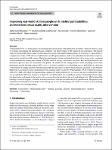Item Infomation
Full metadata record
| DC Field | Value | Language |
|---|---|---|
| dc.contributor.author | Stefan Carlo, Michalski | - |
| dc.contributor.author | Nicholas Charles, Gallomarino | - |
| dc.contributor.author | Ancret, Szpak | - |
| dc.date.accessioned | 2023-04-10T04:06:05Z | - |
| dc.date.available | 2023-04-10T04:06:05Z | - |
| dc.date.issued | 2023 | - |
| dc.identifier.uri | https://link.springer.com/article/10.1007/s10055-023-00759-2 | - |
| dc.identifier.uri | https://dlib.phenikaa-uni.edu.vn/handle/PNK/7717 | - |
| dc.description | CC BY | vi |
| dc.description.abstract | Virtual reality (VR) is a promising tool for training life skills in people with intellectual disabilities. However, there is a lack of evidence surrounding the implementation, suitability, and effectiveness of VR training in this population. The present study investigated the effectiveness of VR training for people with intellectual disabilities by assessing (1) their ability to complete basic tasks in VR, (2) real-world transfer and skill generalisation, and (3) the individual characteristics of participants able to benefit from VR training. Thirty-two participants with an intellectual disability of varying severity completed a waste management training intervention in VR that involved sorting 18 items into three bins. | vi |
| dc.language.iso | en | vi |
| dc.publisher | Springer | vi |
| dc.subject | Virtual reality | vi |
| dc.subject | VR | vi |
| dc.title | Improving real-world skills in people with intellectual disabilities: an immersive virtual reality intervention | vi |
| dc.type | Book | vi |
| Appears in Collections | ||
| OER - Công nghệ thông tin | ||
Files in This Item:

